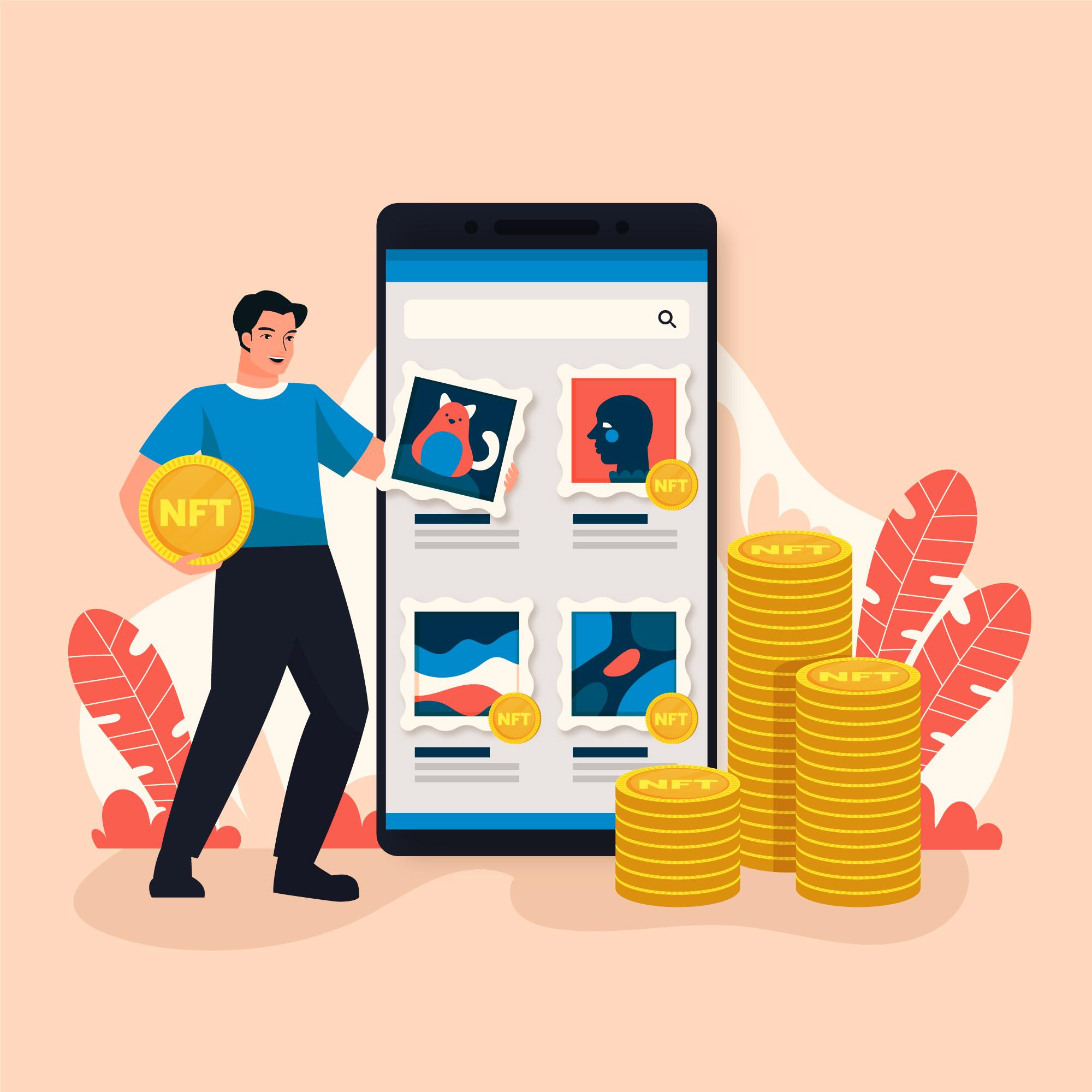In the rapidly evolving landscape of online commerce, two buzzworthy phenomena have captured the attention of tech-savvy consumers and forward-thinking businesses alike: NFTs (Non-Fungible Tokens) and E-commerce. Individually, they represent significant shifts in how we create, buy, and sell digital assets and physical products. But what happens when these two forces combine? In this blog post, we’ll dive into the fusion of NFTs and E-commerce, exploring how they are reshaping the digital art and online retail industries.
NFTs: A Brief Overview 🚀
Non-Fungible Tokens Defined: NFTs are digital assets that represent ownership or proof of authenticity of a unique item using blockchain technology. Unlike cryptocurrencies like Bitcoin or Ethereum, which are fungible and interchangeable, NFTs are one-of-a-kind, making them ideal for representing digital art, collectibles, and other unique assets.
Ownership and Scarcity: NFTs give creators and collectors the ability to prove ownership and scarcity of digital assets, revolutionizing the concept of ownership in the digital realm. Each NFT has a distinct value, and this uniqueness is recorded on the blockchain.
Immutability and Provenance: One of the key benefits of NFTs is their immutability. Once recorded on the blockchain, ownership and transaction history cannot be altered, providing a transparent and trustworthy record of a digital asset’s provenance.
Interoperability: NFTs can be traded and used across different platforms and marketplaces, enabling a wide range of applications beyond digital art, including virtual real estate, in-game items, and more.
Digital Art and NFTs 🎨
Unlocking Value for Artists: NFTs have become a game-changer for digital artists. They enable creators to monetize their work directly, without intermediaries, by selling digital art pieces as NFTs. This empowers artists to gain greater control over their work and income.
Royalties and Resale: Unlike traditional art sales where artists often receive a one-time payment, NFTs enable artists to earn royalties every time their NFT changes hands in the secondary market. This ongoing income stream benefits artists in the long term.
Expanding Possibilities: NFTs allow digital artists to explore new creative horizons. They can experiment with interactive art, music, virtual reality, and even collaborations with other artists, all while leveraging the power of blockchain technology for authenticity and ownership verification.
Democratization of Art: NFTs open up opportunities for emerging artists to gain recognition and monetize their work in ways that were previously challenging within the traditional art world. It eliminates many of the gatekeepers and barriers to entry.
Digital Scarcity: NFTs introduce the concept of digital scarcity, creating a sense of exclusivity that drives demand among collectors. The knowledge that there is only one authentic version of a digital artwork adds to its perceived value.
The Intersection of NFTs and E-commerce 🌐
Emerging Marketplaces: E-commerce platforms are quickly adapting to accommodate NFT sales. Marketplaces like Shopify and WooCommerce are integrating NFT functionality, making it easier for online retailers to sell digital assets. This integration simplifies the process for both sellers and buyers.
Hybrid Stores: Some E-commerce businesses are exploring hybrid models, offering both physical products and NFTs in their online stores. This approach caters to a diverse customer base, allowing them to purchase tangible goods alongside unique digital assets.
Limited Edition Drops: Retailers are using NFTs to release limited edition versions of their products. These NFTs may include unique perks or bonuses, such as access to exclusive content or events, creating a sense of exclusivity and urgency.
Collectible Merchandise: NFTs are being used to enhance the collectible aspect of merchandise. Customers can buy a physical product and receive a related NFT as a bonus, making the purchase more appealing and memorable.
NFT-backed Certificates: E-commerce businesses are leveraging NFTs to issue certificates of authenticity for physical products. Customers receive an NFT representing their purchase, which serves as proof of the product’s origin and quality.
Benefits for E-commerce Businesses 📈
Customer Engagement: NFTs create opportunities for immersive marketing campaigns, gamification, and community engagement, which can help E-commerce businesses build loyal customer bases. Interactive NFT experiences can increase customer interaction and retention.
Diversification of Revenue Streams: Selling NFTs alongside physical products opens up additional revenue streams for online retailers. This diversification is especially valuable in industries like fashion and gaming, where digital assets have a strong appeal.
Brand Authenticity: Embracing NFTs can enhance a brand’s authenticity and innovation. Businesses that adopt NFT technology signal to their customers that they are forward-thinking and willing to embrace emerging trends in digital commerce.
Global Reach: NFTs are borderless, allowing E-commerce businesses to tap into a global market of collectors and enthusiasts. This expanded reach can lead to increased sales and brand exposure.
Challenges and Considerations 🧐
Environmental Concerns: The energy consumption of blockchain networks used for NFTs, such as Ethereum, has raised environmental concerns. Some e-commerce businesses are exploring eco-friendly alternatives, like NFTs built on more energy-efficient blockchains.
Market Volatility: The NFT market can be highly volatile, with prices of digital assets fluctuating significantly over short periods. Businesses should be cautious when investing in NFTs and consider diversifying their NFT portfolio.
Legal and Copyright Issues: The ownership and copyright of digital assets can become complex when NFTs are involved. E-commerce businesses must navigate these legal challenges carefully, ensuring they have the right to sell NFTs related to specific content.
User Education: Many consumers are still unfamiliar with NFTs. E-commerce businesses may need to invest in educating their customers about the technology, its benefits, and how to participate in the NFT ecosystem.
Real-World Examples 🌍
NBA Top Shot 🏀
NBA Top Shot is a prime example of how NFTs can merge with E-commerce. It allows basketball fans to buy, sell, and trade officially licensed NBA collectible highlights as NFTs. Users can own unique moments from their favorite games, and the scarcity and authenticity of these NFTs make them highly desirable among basketball enthusiasts.
Fashion and Luxury Brands 👗
Luxury brands like Gucci and Prada have explored NFTs, offering virtual fashion items and collectibles. These brands are tapping into the digital art world and expanding their customer base beyond traditional fashion enthusiasts. NFTs allow luxury brands to create unique and exclusive digital fashion experiences.
CryptoArt 🎨
Platforms like SuperRare and Rarible are dedicated to the sale of digital art as NFTs. Artists can mint their work as NFTs and auction them off to the highest bidder. This has opened up a new avenue for artists to gain recognition and financial support for their creative endeavors, all while preserving the integrity and authenticity of their work through blockchain technology.
Virtual Real Estate 🏡
In virtual worlds like Decentraland and The Sandbox, users can buy virtual land as NFTs. E-commerce businesses are eyeing these spaces for virtual storefronts and events. Virtual real estate in NFT-powered metaverse environments holds the promise of creating unique and immersive shopping experiences.
The Future of NFTs and E-commerce 🚀
The fusion of NFTs and E-commerce is still in its infancy, but the potential is immense. As technology advances and consumer adoption grows, we can expect to see:
Enhanced Virtual Shopping Experiences: Virtual showrooms and interactive NFT-powered shopping experiences will become more common, blurring the line between online and offline retail. Customers will be able to explore products in virtual environments before making a purchase.
NFT-backed Loyalty Programs: E-commerce businesses may introduce NFT-based loyalty programs, rewarding customers with exclusive digital collectibles for their continued support. These collectibles can represent status or access to special promotions.
Broader Adoption: As NFTs become more mainstream, we can anticipate a broader range of industries, from entertainment to education, embracing this technology. NFTs could become a standard feature of the digital economy.
Sustainability Solutions: E-commerce platforms and NFT marketplaces will likely invest in eco-friendly blockchain solutions to address environmental concerns. This shift towards sustainability will resonate with consumers who prioritize ethical and environmentally responsible practices.
Conclusion 🎉
The fusion of NFTs and e-commerce is a dynamic space where digital art and online retail converge. It’s a space of innovation, challenges, and opportunities. As these two worlds continue to evolve and merge, businesses that embrace this fusion will be well-positioned to thrive in the digital age. Whether you’re an artist looking to monetize your creations or an e-commerce entrepreneur seeking new revenue streams, the NFT and E-commerce fusion offers a tantalizing glimpse into the future of online commerce.



